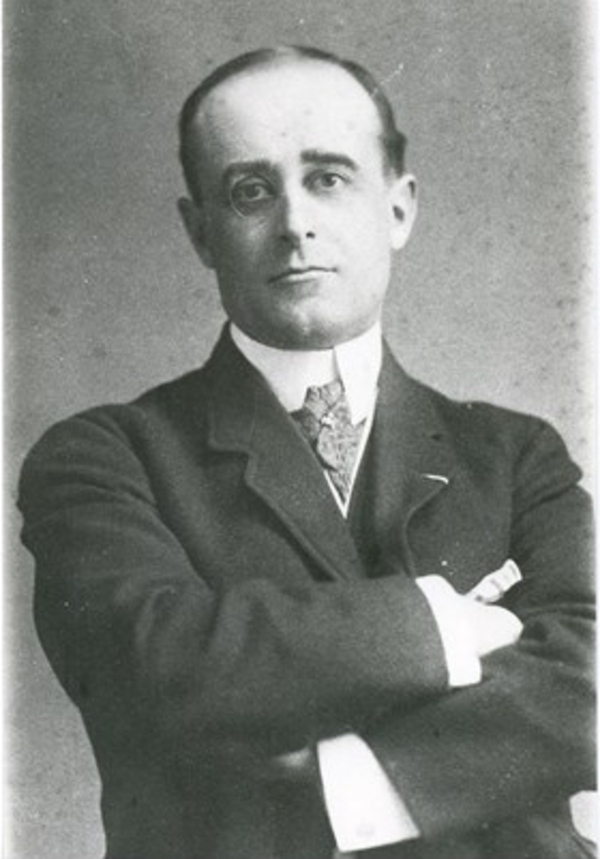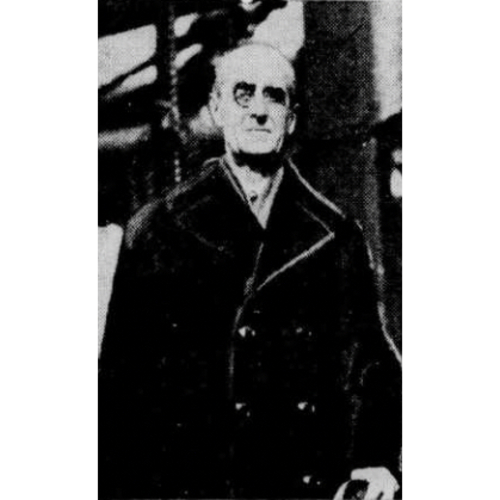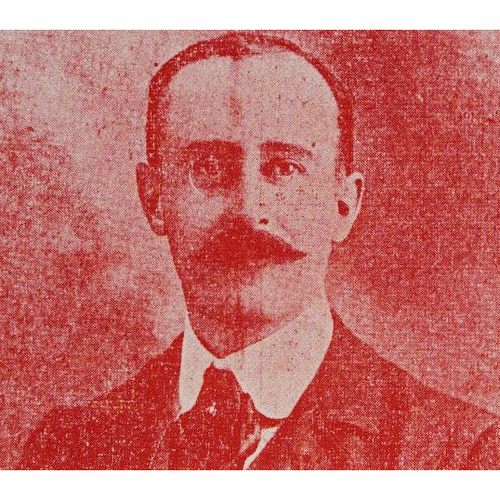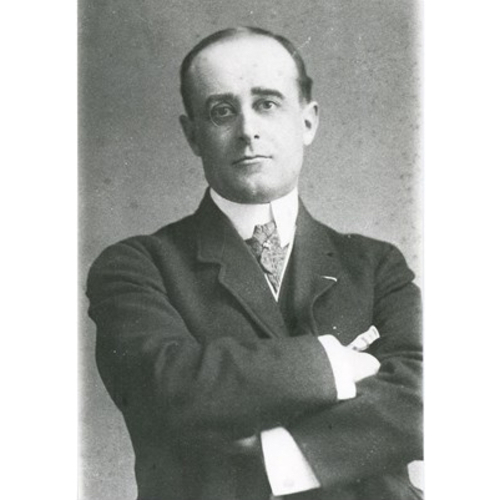
Source: Link
LEFEBVRE D’HELLENCOURT, HENRI (baptized Henri-Marie-Victor Lefebvre, he added d’Hellencourt to his surname in 1876), army officer, homesteader, editor, and consular agent; b. 11 Sept. 1862 in Paris, son of Henri-Émile Lefebvre, a police commissioner’s chief of staff, and Louise Kreusler (Kraeuseler); m. 26 Aug. 1891 Louise-Eugénie Bellard, divorced wife of Louis-Ernest-Hilaire-Aimé Renard, in Montreal; they had no children; d. 8 May 1940 at Thouars, France.
Henri Lefebvre d’Hellencourt came from a family of civil servants; his father, at the end of his career, was a tax collector. He had two sisters, Émilie and Marie, and a brother, Charles. He pursued his secondary and post-secondary education at two prestigious French institutions: the Collège Notre-Dame de Sainte-Croix de Neuilly (Neuilly-sur-Seine) (1872–79) and the Lycée Henri-IV in Paris (1879–81), where he took the preparatory classes required for elite institutions. He attended the École Spéciale Militaire de Saint-Cyr from 26 Oct. 1881 to 1 Oct. 1883 and was a member of the promotion (graduating class) d’Égypte, obtaining the rank of second lieutenant. He spoke and wrote elegant French and was competent in German and English. Promoted lieutenant in 1887, Lefebvre d’Hellencourt passed the competitive written examination of the École Supérieure de Guerre but failed the oral test in April 1888.
In May, Louise-Eugénie Bellard, recently separated from her husband, came to live in Tours, where Lefebvre d’Hellencourt had been stationed since July 1887. The two began a romantic relationship, which caused a crisis in the lieutenant’s family and led to his resignation from the army in 1891. They then emigrated to Montreal, where a Methodist pastor married them on 26 August. At the end of October they arrived in Manitoba, at Sainte-Anne-des-Chênes. Through a priest from France, Henri’s mother warned the parish curé, Louis-Raymond Giroux, that Louise-Eugénie was a divorcee, which prompted the archbishop of Saint-Boniface, Alexandre-Antonin Taché*, to prohibit the couple from attending the parish church in 1892. This situation likely prevented Lefebvre d’Hellencourt from pursuing a political career. He farmed a homestead between 1894 and 1897, and they then settled in Winnipeg.
Manitoba was in the grip of a conflict over schools that had reached a crisis in 1890. Following his victory in the June 1896 election, the Liberal Prime Minister Sir Wilfrid Laurier* had negotiated, with his provincial counterpart, Thomas Greenway*, the Laurier–Greenway agreement, which was denounced by the new archbishop of Saint-Boniface, Adélard Langevin*, but tolerated by Pope Leo XIII. Facing Conservative opposition at the francophone Saint-Boniface (Winnipeg) weekly, Le Manitoba, Laurier needed francophone Liberal support in Winnipeg for his compromise policy. He found Lefebvre d’Hellencourt, who would back him throughout his career. Lefebvre d’Hellencourt became the first editor of L’Écho de Manitoba, a weekly publication founded in January 1898 by francophone Liberals and with an average circulation of 1,400. Well educated and diplomatic, Lefebvre d’Hellencourt quickly grasped and clearly presented political, religious, and social issues. He applied himself to explaining Laurier’s policies while at the same time taking care not to offend against the archbishopric, which nevertheless set a redoubtable pamphleteer, Dom Paul Benoit*, and two young Conservative journalists, the brothers Noël and Joseph Bernier*, against him. No less dangerous for the editor were the intrigues of Liberal politicians, who were divided into rival factions and eager to get their hands on L’Écho de Manitoba to further their ambitions. He was also being closely observed by the federal Liberal minister of the interior and superintendent general of Indian affairs, the Manitoban Clifford Sifton*. Lefebvre d’Hellencourt generally held himself aloof from local rivalries. He answered directly to Laurier, which irritated certain politicians.
Lefebvre d’Hellencourt was able to count on the moral and financial support of the prime minister. On 4 June 1900 Laurier wrote to him with regard to the school ruling: “I am following with greater interest than ever your polemic on this matter in ‘L’Echo de Manitoba.’ I cannot overstate how much I approve of and admire your way of dealing with it.” The prime minister suggested, on 4 August, that “[he] make politics [his] career.” Lefebvre d’Hellencourt declined the invitation because of his wife’s status as a divorcee. Had he accepted, Sifton would have supported his candidacy in the federal riding of Provencher.
Lefebvre d’Hellencourt addressed international topics. For example, he favoured Laurier’s position on the question of Canada’s defence policy, which was counter to the imperialist stance taken by Joseph Chamberlain, the secretary of state for the colonies, at the 1902 colonial conference [see Relations with the British Empire]. The journalist believed that Canada had to resist Chamberlain’s military imperialism and reject his plan for an imperial federation, which would threaten the dominion’s independence. His years at Saint-Cyr, also a time of great Franco-British colonial tension, were at the root of this opinion.
Seeking to play a quasi-diplomatic role, in January 1902 Lefebvre d’Hellencourt accepted an appointment as the representative of the Alliance Française in Winnipeg and founded a literary circle. In December, backed by Laurier and the consul general of France in Quebec, Alfred Kleczkowski, he became the consular agent of France in Winnipeg, which infuriated Conservatives as well as a few Liberals. He saw this position as a means of extending the reach of L’Écho de Manitoba, but he was also forced to temper ideological disputes over La République Radicale, which divided French immigrants.
Archbishop Langevin believed that the weekly’s influence had ensured the Liberals’ success in francophone ridings in the 1903 provincial election. In September he decided “to block the circulation of the newspaper L’Écho du Manitoba, which is written in a spirit of malevolence.” The clergy set out to reduce the readership of the publication, which had routinely condemned their intervention in favour of the Conservatives during the campaign. Dom Benoit, then priest of the parish of Notre-Dame-de-Lourdes, returned issues of the periodical to the sender instead of distributing them to subscribers.
Weary of personal attacks by both Conservatives and Liberals, Lefebvre d’Hellencourt sought in vain to obtain a federal post in France as a Paris-based commercial agent or immigration officer. He also asked Laurier, in 1902, for a position on a potential “French Liberal newspaper in Montreal.” The prime minister, however, wanted to keep him in Winnipeg to monitor the Liberal Franco-Manitobans as well as Sifton, whose lack of enthusiasm for attracting francophones to the prairies was deplored by the editor. Nevertheless, following Sifton’s resignation on 28 Feb. 1905, Lefebvre d’Hellencourt acknowledged that the minister had greatly contributed to promoting immigration in the west.
Facing ever greater opposition from the clergy, Conservatives, and Franco-Manitoban Liberal officials (mla Horace Chevrier, mp Joseph-Ernest Cyr, and organizer Joseph-François Prud’homme, who wanted to run L’Écho du Manitoba) as well as the social ostracism endured by his wife, Lefebvre d’Hellencourt again asked Laurier for an editing position in Montreal. In July 1905 he left Winnipeg, the editorship of the weekly (of which only two editions were published after his departure), and his post as consular agent. He worked briefly in Ottawa on the editorial staff of Le Temps and then became political editor of Quebec City’s Le Soleil as of 1 July 1906. Quebec’s Liberal premier, Lomer Gouin*, controlled the newspaper along with Laurier, and they, like the mayor of Quebec City, Georges Garneau*, highly valued Lefebvre d’Hellencourt’s articles. This was not the case for Henri Bourassa* and some nationalists, as was demonstrated by an incident that took place on 5 Aug. 1907 in the city’s Saint-Roch ward, a Liberal stronghold where Bourassa was holding a meeting. Le Soleil warned the Ligue Nationaliste Canadienne [see Olivar Asselin] that it was not welcome there. Following a stormy session, Lefebvre d’Hellencourt and Charles-Alleyn Taschereau, a lawyer and militant nationalist, exchanged blows on the terrace of the Château Frontenac, which provoked a general outcry in the Canadian press.
In 1911 Lefebvre d’Hellencourt and his wife accompanied Laurier to the Imperial Conference and George V’s coronation in London. During World War I the former Saint-Cyr student wrote noteworthy articles on military operations. As a patriot from France, and unlike Laurier, he expressed his support for conscription. He was required to take a month’s leave in June 1917 when Conservative prime minister Sir Robert Laird Borden introduced the Military Service Act in the House of Commons. Subsequently, he limited his activities to writing columns on the war. He left his position at the end of 1919 and the following October, with Gouin’s support, became an editor at the Liberal Montreal newspaper La Presse, where he would remain until 1928. The government of France made him a chevalier of the Legion of Honour on 26 July.
After suffering a stroke, Henri Lefebvre d’Hellencourt retired in 1928, and on 14 Feb. 1929 he and his wife set sail from New York for France on the liner De Grasse. He was reunited with his mother, with whom he had long been reconciled. Until his death in 1940 he divided his time between Paris and Thouars, where his wife had retained family ties. In addition to being an accomplished journalist, he was a talented watercolourist. The extraordinary career of this native of France had made him a political intimate of Laurier and a force on whom the prime minister could rely.
Henri Lefebvre d’Hellencourt also wrote L’avenir de Québec: texte d’une conférence donnée le 16 décembre 1913 à l’académie commerciale de Québec ([Québec?, 1913?]) and Le scandale Forget: articles publiés dans “Le Soleil” depuis le 30 décembre 1912 ([Québec?, 1913?]).
AM, GR 1603. Arch. de la Soc. Hist. de Saint-Boniface (Winnipeg), Fonds Corporation archiépiscopale catholique romaine de Saint-Boniface, sér. Alexandre-Antonin Taché; sér. Louis-Philippe-Adélard Langevin; Fonds Paul Benoît c.r.i.c. Arch. de Paris, “Actes d’état civil,” 6e arrondissement, 11 juill. 1861, no.470; 12 sept. 1862, no.2322: archives.paris.fr/s/4/etat-civil-actes (consulted 13 Jan. 2020). Arch. Départementales, Deux-Sèvres (Niort, France), “Reg. paroissiaux et d’état civil,” Saint-Martin-de-Mâcon, 17 avril 1882: archives-deux-sevres-vienne.fr/archive/resultats/etatcivil/n:100?type=etatcivil (consulted 13 Jan. 2020). Arch. du Ministère des Affaires Étrangères (Paris), Corr. consulaire, corr. politique, Montréal, I: 18–19, and Québec, XII: 375; Corr. politique, Angleterre, LXXXV: 32; XCIX: 179–80; Corr. politique et commerciale, dite “Nouvelle série” (1896–1918), Canada NS, XIX: 5–7. BANQ-CAM, CE601-S103, 26 août 1891. BANQ-Q, P1000, S3, D961. LAC, R7693-0-0; R10811-0-X. L’Écho du Manitoba (Winnipeg), 1898–1905. La Presse, 1920–28. Le Soleil, 1906–19. Bernard Pénisson, “Henri d’Hellencourt et les Métis, 1898–1905,” Cahiers franco-canadiens de l’Ouest (Winnipeg), 2 (1990): 5–20; Henri d’Hellencourt: un journaliste français au Manitoba (1898–1905) (Saint-Boniface [Winnipeg], 1986); “Louise d’Hellencourt et Christine de La Salmonière: deux Françaises au Manitoba,” Cahiers franco-canadiens de l’ouest, 12 (2000): 153–79. Rumilly, Hist. de la prov. de Québec, vol.19, 22.
Cite This Article
Bernard Pénisson, “LEFEBVRE D’HELLENCOURT, HENRI (baptized Henri-Marie-Victor Lefebvre),” in Dictionary of Canadian Biography, vol. 16, University of Toronto/Université Laval, 2003–, accessed May 29, 2025, https://www.biographi.ca/en/bio/lefebvre_d_hellencourt_henri_16E.html.
The citation above shows the format for footnotes and endnotes according to the Chicago manual of style (16th edition). Information to be used in other citation formats:
| Permalink: | https://www.biographi.ca/en/bio/lefebvre_d_hellencourt_henri_16E.html |
| Author of Article: | Bernard Pénisson |
| Title of Article: | LEFEBVRE D’HELLENCOURT, HENRI (baptized Henri-Marie-Victor Lefebvre) |
| Publication Name: | Dictionary of Canadian Biography, vol. 16 |
| Publisher: | University of Toronto/Université Laval |
| Year of revision: | 2022 |
| Access Date: | May 29, 2025 |





